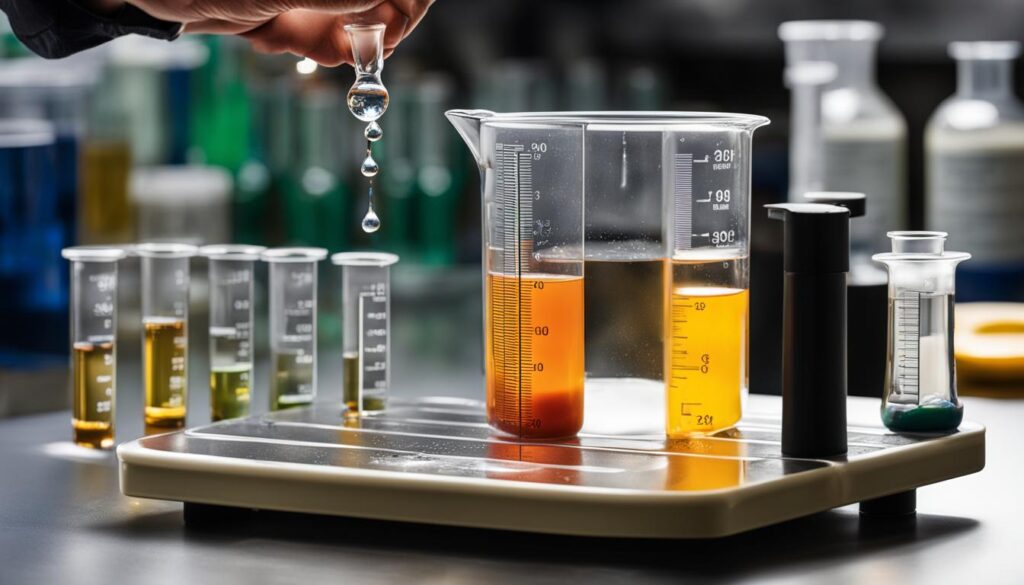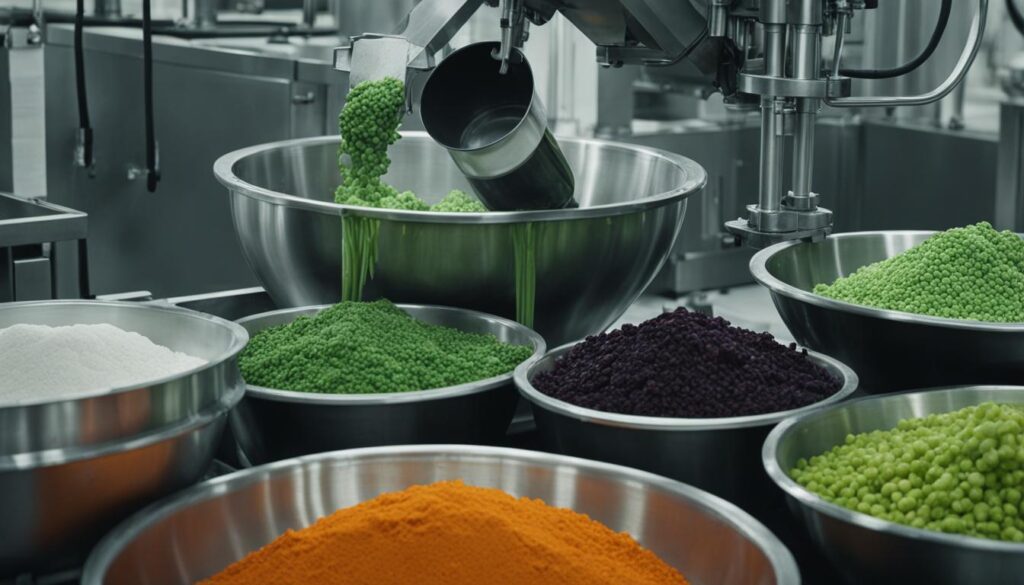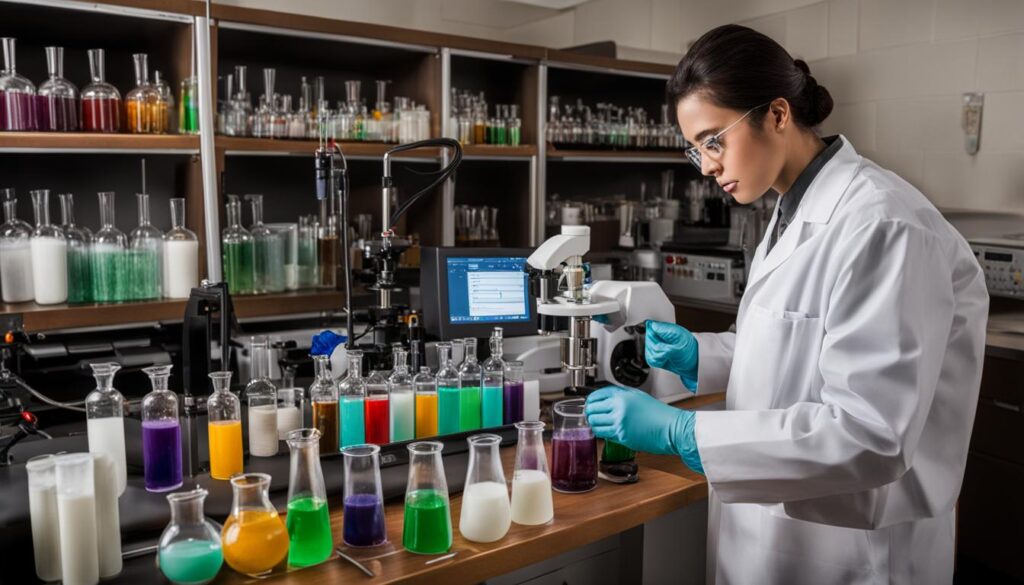Potassium hydroxide, also known as lye or caustic potash, is a versatile and highly useful chemical compound. With a pH of 13.5, it is commonly found in the form of powder, pellets, or flakes. The importance of potassium hydroxide extends across various industries, from soap making and biodiesel production to textile manufacturing and battery production. Its ability to regulate pH levels makes it indispensable in agriculture and water treatment. Additionally, it serves as a precursor to other potassium compounds and can be used in food processing as a stabilizer and thickening agent.
Key Takeaways:
- Potassium hydroxide is a versatile and valuable chemical compound with a pH of 13.5.
- It finds applications in soap making, biodiesel production, textile manufacturing, and battery production, among others.
- Potassium hydroxide plays a crucial role in regulating pH levels in agriculture and water treatment.
- It serves as a precursor to other potassium compounds and is used in food processing as a stabilizer and thickening agent.
- The importance of potassium hydroxide lies in its ability to enhance efficiency, effectiveness, and quality across various industries.
Potassium Hydroxide in Soap Making

In the world of soap making, potassium hydroxide is a crucial ingredient that plays a significant role in creating high-quality soaps. When combined with surfactants and other sources of alkalinity, potassium hydroxide helps to remove contaminants from various surfaces. The alkaline solution formed with potassium hydroxide works by lowering the surface tension, effectively separating the contaminants and allowing for easy rinsing.
Unlike sodium hydroxide, which is used in the production of solid bar soaps, potassium hydroxide is typically utilized in the making of liquid soaps. This is because potassium hydroxide has a stronger affinity for water, creating a soap that is more soluble and easier to dilute.
With its powerful cleaning properties, potassium hydroxide is particularly effective in removing tough stains, grease, and oil from surfaces. This makes it a preferred choice in cleaning products such as dishwashing liquids and degreasers.
It is important to note that the concentration of potassium hydroxide in soap products should be adjusted based on the surface being cleaned. A higher concentration may be necessary for heavily soiled areas, while a lower concentration is suitable for delicate surfaces that require gentler cleaning.
“Potassium hydroxide’s ability to remove contaminants and regulate pH levels makes it an invaluable ingredient in soap making. It ensures the creation of effective, high-quality soaps that leave surfaces clean and refreshed.”
Benefits of Potassium Hydroxide in Soap Making:
- Effective removal of tough stains, grease, and oil
- Helps create highly soluble and easily diluted liquid soaps
- Enables gentle cleaning for delicate surfaces
- Contributes to the production of high-quality soaps with excellent cleansing properties
| Pros | Cons |
|---|---|
| Effective in removing tough stains and grease | Requires careful concentration adjustment |
| Creates highly soluble and easily diluted liquid soaps | Not suitable for solid bar soap production |
| Contributes to the production of high-quality soaps |
Potassium Hydroxide in Industrial Applications

Potassium hydroxide, also known as lye or caustic potash, finds extensive use in numerous industrial applications. Its versatility and strong alkali properties make it a highly sought-after chemical in various manufacturing processes.
One of the significant industrial applications of potassium hydroxide is in the production of biodiesel. It acts as a catalyst in the transesterification process, converting vegetable oils or animal fats into biodiesel fuel. Potassium hydroxide facilitates the reaction by breaking down triglycerides and forming the methyl esters that constitute biodiesel. This sustainable energy source has gained popularity due to its lower environmental impact compared to traditional fossil fuels.
In the textile industry, potassium hydroxide is utilized for mercerizing cotton fabric. This process enhances the fiber’s strength, flexibility, and absorption capacity by removing impurities and swelling the cellulose structure. This treatment ensures the production of high-quality textiles that are soft, lustrous, and less prone to shrinkage.
“Potassium hydroxide is a crucial component in the production of textiles, ensuring the creation of durable fabrics with improved properties.”
Batteries and fuel cells also rely on the unique properties of potassium hydroxide. It is used as an electrolyte to facilitate the conduction of ions between the anode and cathode, enabling the flow of electricity. Potassium hydroxide’s ability to conduct ions and resist degradation over time makes it a vital component in bringing energy efficiency to portable electronic devices, electric vehicles, and grid-scale energy storage systems.
In addition to its role as an electrolyte, potassium hydroxide is incorporated into paints and coatings to enhance their durability and resistance to abrasion. It acts as a pH modifier, preventing the degradation of pigments and ensuring optimal color stability. This versatile compound also finds application as a cleaner, effectively removing stubborn stains, graffiti, and residues in various industries.
Potassium hydroxide plays a crucial role in the purification of gas. It effectively removes sulfur compounds from natural gas streams, improving their quality and reducing harmful emissions. By eliminating sulfur compounds, potassium hydroxide helps to comply with environmental regulations and minimize air pollution.
The wide range of industrial applications for potassium hydroxide underscores its importance in various sectors. Its corrosion resistance, alkalinity, and pH-regulating abilities contribute to the efficiency and effectiveness of manufacturing processes in industries such as biodiesel production, textiles, battery manufacturing, paints, and gas purification.
Potassium Hydroxide for pH Adjustment

Potassium hydroxide, also known as lye or caustic potash, is widely utilized in various industries for pH adjustment purposes. Its ability to regulate pH levels is essential in maintaining optimal conditions for several processes.
Importance in Agriculture
In the field of agriculture, potassium hydroxide plays a vital role in raising the pH of acidic soils. By neutralizing the acidity, it creates a more favorable environment for crop growth, ensuring that plants can effectively absorb essential nutrients from the soil.
Application in the Water Industry
Potassium hydroxide is also crucial in the water industry, where it is used to maintain a neutral pH in potable and clean water supplies. By adjusting the pH levels, it helps ensure that the water is safe for consumption and avoids any potential negative effects on equipment or infrastructure.
| Potassium Hydroxide for pH Adjustment | Industries |
|---|---|
| Agriculture | Raises pH of acidic soils, promoting crop growth |
| Water Treatment | Ensures a neutral pH in potable and clean water supplies |
Potassium hydroxide’s role in pH adjustment is instrumental in a wide range of industries, enabling optimal conditions for various processes. Whether it’s in agriculture or water treatment, its ability to regulate pH levels is essential for maintaining quality and effectiveness.
Potassium Hydroxide in Agriculture

Potassium hydroxide plays a significant role in agriculture. It is used to raise the pH of acidic soils, making them more suitable for plant growth. By neutralizing the acidity, potassium hydroxide helps create a balanced environment for optimal crop production.
Additionally, potassium hydroxide serves as a potassium fertilizer, supplying essential nutrients to plants. Potassium is a vital element for plant health, contributing to root development, disease resistance, and overall growth. By incorporating potassium hydroxide into agricultural practices, farmers can ensure that their crops receive the necessary nutrients to thrive.
Using potassium hydroxide in agriculture offers multiple benefits. First, it helps improve soil health by remedying the effects of acidity. Acidic soils can hinder nutrient absorption and microbial activity, limiting plant growth. By raising the pH level, potassium hydroxide helps restore the balance and allows plants to access nutrients more efficiently.
Moreover, potassium hydroxide enhances crop yields by providing important macronutrients. Potassium promotes overall plant development, including the growth of strong stems, efficient water usage, and resistance to environmental stressors. With potassium hydroxide, farmers can ensure that their crops reach their maximum potential in terms of quality and quantity.
Benefits of Potassium Hydroxide in Agriculture:
- Adjusts pH levels in acidic soils
- Enhances nutrient absorption
- Promotes healthy root development
- Boosts crop yield and quality
- Improves plant resistance to diseases and stressors
Potassium hydroxide is a valuable tool in modern agriculture, aiding farmers in achieving optimal soil conditions and maximizing crop output. Its versatile properties make it an essential component for sustainable and efficient agricultural practices.
Potassium Hydroxide for Cleaning

When it comes to effective cleaning agents, potassium hydroxide stands out due to its corrosive nature and strong alkalinity. This powerful chemical compound is widely used in various cleaning applications due to its ability to tackle tough stains, grease, and grime.
An area where potassium hydroxide finds extensive use is in the production of paint and varnish removers. Its caustic properties allow it to break down and remove layers of paint, making it an essential ingredient in paint stripping products.
Potassium hydroxide also plays a vital role in electroplating and lithography processes. It is used to prepare surfaces by stripping off contaminants and creating a clean and smooth base for these applications.
One of the notable uses of potassium hydroxide is in liquid drain cleaners. These cleaners often contain high concentrations of potassium hydroxide, which acts as a powerful unclogging agent. The caustic nature of potassium hydroxide helps dissolve organic matter, allowing for smooth flow and unclogged drains.
It is important to exercise caution when handling potassium hydroxide for cleaning purposes. Due to its powerful cleaning properties, it can cause skin irritation and burns if not used properly. Proper protective equipment, such as gloves and goggles, should be worn when working with this chemical.
“Potassium hydroxide is an essential cleaning agent renowned for its ability to remove tough stains and unclog drains effectively.”
Overall, potassium hydroxide showcases its effectiveness as a cleaning agent through its corrosive properties. From paint removal to drain unclogging, this versatile compound proves to be an invaluable tool in maintaining cleanliness and hygiene in various applications.
Now, let’s take a look at a table highlighting the different cleaning applications of potassium hydroxide:
| Cleaning Application | Description |
|---|---|
| Paint and Varnish Removal | Potassium hydroxide is used to break down and remove layers of paint and varnish, aiding in surface preparation. |
| Electroplating and Lithography | This chemical compound helps strip off contaminants from surfaces, ensuring substrate purity and optimal adhesion. |
| Liquid Drain Cleaners | High concentrations of potassium hydroxide in drain cleaners effectively dissolve organic matter, unclogging drains. |
Potassium Hydroxide in Food Processing

In the realm of food processing, potassium hydroxide plays a vital role as an essential component. Its versatility and unique properties make it an invaluable tool in ensuring the quality, taste, texture, and preservation of various food products.
One of the key uses of potassium hydroxide in food processing is its ability to adjust pH levels. As a potent alkaline compound, potassium hydroxide acts as a reliable stabilizer, helping to maintain the desired acidity or alkalinity in food. This pH regulation is crucial in achieving the intended flavor profiles and extending the shelf life of products.
Beyond its stabilizing function, potassium hydroxide also serves as a thickening agent in food processing. By interacting with certain food components, it enhances viscosity, texture, and overall mouthfeel. This property is particularly beneficial in creating creamy textures in dairy products or enhancing the consistency of sauces and dressings.
The use of potassium hydroxide in food processing not only enhances the sensory experience of consumers but also contributes to the safety of food products. Its antimicrobial properties can inhibit the growth of harmful bacteria and other microorganisms, reducing the risk of foodborne illnesses.
Here is a table showcasing some common applications of potassium hydroxide in food processing:
| Food Industry | Application |
|---|---|
| Bakery |
|
| Dairy |
|
| Meat and Seafood |
|
| Food Preservation |
|
It is important to note that the usage of potassium hydroxide in food processing must comply with strict regulatory standards to ensure food safety. Proper handling and dosing procedures are crucial to avoid any adverse effects on the final product or consumer health.
Importance of Potassium Hydroxide
Potassium hydroxide is a compound of significant importance across various industries and applications. Its versatility, strong alkali properties, and pH-regulating capabilities make it an invaluable chemical for numerous processes. Without potassium hydroxide, industries such as soap making, biodiesel production, textile manufacturing, and water treatment would struggle to achieve their desired results. The presence of potassium hydroxide ensures the efficiency, effectiveness, and quality of these essential processes.
The versatility of potassium hydroxide can be attributed to its ability to react with a wide range of substances, as well as its diverse applications in different fields. From its role in soap making to its importance in water treatment, potassium hydroxide plays a crucial role in several pivotal industries. It is also a key component in the production of biodiesel, where it facilitates the conversion of vegetable oils and animal fats into usable fuel. Additionally, potassium hydroxide aids in the manufacture of textiles, batteries, and other industrial products, showcasing its vital role in various manufacturing processes.
One of the significant advantages of potassium hydroxide is its pH-regulating capabilities. It can be used to adjust acidity levels in numerous applications, such as agriculture and water treatment. In agriculture, potassium hydroxide helps raise the pH of acidic soils, ensuring optimal conditions for plant growth. It also plays a vital role in water treatment facilities, where it is used to maintain a neutral pH in potable and clean water supplies, ensuring the quality and safety of our drinking water.
“Potassium hydroxide acts as a catalyst and facilitator in a wide range of industrial processes, making it an indispensable component in various applications.”
Furthermore, potassium hydroxide serves as a precursor to other potassium compounds, making it a valuable chemical in numerous synthesis reactions. Its strong alkali properties enable it to react with acids, resulting in the production of various potassium salts used in different industries.
The Importance of Potassium Hydroxide in Key Industries:
| Industry | Applications |
|---|---|
| Soap Making | Creates alkaline solutions necessary for removing contaminants from surfaces. |
| Biodiesel Production | Facilitates the conversion of vegetable oils and animal fats into usable fuel. |
| Textile Manufacturing | Aids in the production of textiles through the efficient removal of impurities. |
| Water Treatment | Maintains a neutral pH in potable and clean water supplies for safe consumption. |
In conclusion, the importance of potassium hydroxide cannot be overstated. Its versatility, strong alkali properties, and pH-regulating capabilities make it an indispensable compound in various industries and applications. From soap making to water treatment, potassium hydroxide plays a critical role in ensuring the efficiency, effectiveness, and quality of many essential processes. Its presence contributes to the success of numerous industries, making it a chemical compound of paramount importance.
Uses of Potassium Hydroxide

Potassium hydroxide, also known as lye or caustic potash, has a wide range of uses across different industries. Its versatile properties and chemical composition make it an essential component in various applications. Let’s explore some of the key uses of potassium hydroxide:
1. Soap Making
Potassium hydroxide plays a crucial role in the production of soap. When combined with surfactants and other alkaline sources, it effectively removes contaminants from surfaces. The alkaline solution created using potassium hydroxide reduces the surface tension, allowing for easy rinsing. To ensure optimal results, soap manufacturers adjust the concentration of potassium hydroxide based on the specific cleaning requirements.
2. Industrial Manufacturing
Potassium hydroxide finds extensive use in industrial manufacturing processes. It is a key component in the production of biodiesel, textiles, batteries, fuel cells, paints, and cleaners. The strong alkali properties and corrosiveness of potassium hydroxide make it effective in these applications. Additionally, potassium hydroxide is utilized for gas purification, removing sulfur compounds to enhance the purity of gases.
3. Agriculture
Agriculture greatly benefits from the use of potassium hydroxide. It is employed for pH adjustment in acidic soils, creating a suitable environment for plant growth. By neutralizing the acidity, potassium hydroxide helps enhance soil fertility and ensures optimal nutrient uptake by crops. Additionally, it can be used as a potassium fertilizer, supplying vital nutrients to plants, contributing to improved soil health and higher crop yields.
4. Water Treatment
Potassium hydroxide is also utilized in water treatment processes to regulate pH levels. It ensures that potable water and clean water supplies maintain a neutral pH, essential for safe consumption. The pH regulation provided by potassium hydroxide contributes to the quality and effectiveness of water treatment, preventing the growth of harmful bacteria and ensuring the delivery of clean, safe drinking water.
5. Food Processing
In the food processing industry, potassium hydroxide serves as a pH regulator, stabilizer, and thickening agent. It is used to adjust the acidity or alkalinity of food products, improving taste, texture, and preservation. Potassium hydroxide plays a vital role in maintaining the quality and safety of various food items, offering benefits in the production of sauces, dressings, beverages, and other processed foods.
The numerous uses of potassium hydroxide highlight its importance in various sectors. Its ability to regulate pH levels, corrosive nature, and contribution to the production of other compounds make it a versatile and indispensable chemical in multiple industries.
Potassium Hydroxide Benefits in Personal Products
Potassium hydroxide, a powerful chemical compound known for its diverse applications, also offers significant benefits when used in holistic and natural personal care products. Its unique properties make it a valuable ingredient in the formulation of soaps, cleansers, and skincare products.
One of the remarkable advantages of potassium hydroxide is its effective cleansing properties. When incorporated into personal care products, it can help remove impurities and pollutants from the skin, promoting a healthy and radiant complexion. The gentle yet thorough cleaning action of potassium hydroxide leaves the skin feeling refreshed and revitalized.
In addition to its cleansing abilities, potassium hydroxide also plays a crucial role in maintaining the pH balance of personal care products. By regulating the acidity or alkalinity, it ensures that these products are gentle and suitable for the skin, minimizing the risk of irritation or discomfort. The pH-balancing properties of potassium hydroxide contribute to the overall efficacy and quality of personal care products.
With its ability to cleanse, remove contaminants, and regulate pH levels, potassium hydroxide is a beneficial ingredient in personal care products. Its inclusion adds value to holistic and natural skincare routines, promoting healthier and more vibrant skin.
FAQ
What are the benefits of potassium hydroxide?
Potassium hydroxide has numerous benefits, including its versatility in various industries, its ability to regulate pH levels, and its contribution to the production of other compounds.
How is potassium hydroxide used in soap making?
Potassium hydroxide is a key ingredient in soap production. It helps remove contaminants from surfaces by creating an alkaline solution that lowers surface tension and allows for easy rinsing.
What are the industrial applications of potassium hydroxide?
Potassium hydroxide is widely used in industries such as biodiesel production, textile manufacturing, battery production, and as a cleaner. It is valued for its corrosive nature and strong alkali properties.
In what ways is potassium hydroxide used for pH adjustment?
Potassium hydroxide is used to raise the pH of acidic soils in agriculture and maintain neutral pH in water treatment processes. It plays a vital role in regulating pH levels in various industries.
How does potassium hydroxide contribute to agriculture?
Potassium hydroxide is used to raise the pH of acidic soils, creating a balanced environment for optimal crop growth. It also serves as a potassium fertilizer, providing essential nutrients to plants.
How is potassium hydroxide utilized for cleaning purposes?
Potassium hydroxide’s corrosive nature and alkalinity make it effective in various cleaning processes. It is used in the production of paint and varnish removers, drain cleaners, and in electroplating and lithography processes.
What is the role of potassium hydroxide in food processing?
Potassium hydroxide is used to adjust pH levels in food, acting as a stabilizer and thickening agent. It ensures the desired acidity or alkalinity in food products, enhancing taste, texture, and preservation properties.
Why is potassium hydroxide important?
Potassium hydroxide is important due to its versatility, strong alkali properties, and pH-regulating capabilities. It plays a crucial role in various industries, contributing to their efficiency, effectiveness, and overall quality.
What are the different uses of potassium hydroxide?
Potassium hydroxide has a wide range of uses, including soap making, industrial manufacturing, agriculture, water treatment, and food processing.
How does potassium hydroxide benefit personal care products?
Potassium hydroxide provides effective cleansing and pH-balancing properties in personal care products, including soaps, cleansers, and skincare products.






